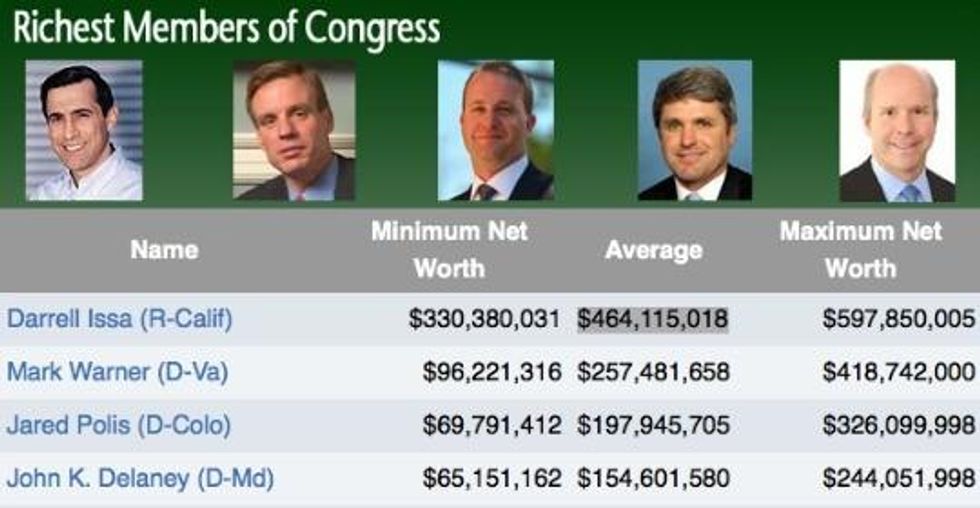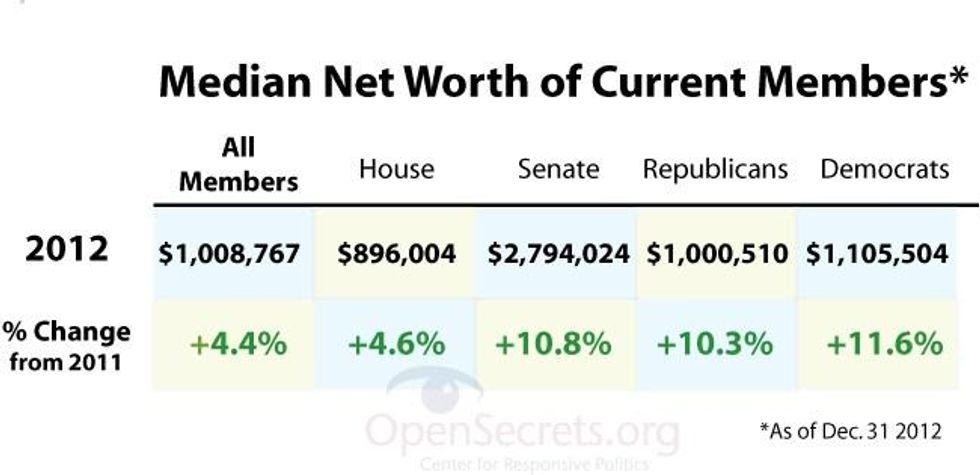

SUBSCRIBE TO OUR FREE NEWSLETTER
Daily news & progressive opinion—funded by the people, not the corporations—delivered straight to your inbox.
5
#000000
#FFFFFF
To donate by check, phone, or other method, see our More Ways to Give page.


Daily news & progressive opinion—funded by the people, not the corporations—delivered straight to your inbox.

According to recent data collected by the group, at least 268 U.S. lawmakers out of 534 total had an average net worth of $1 million or more in 2012.
Of those lawmakers, many are worth far more, with the wealthiest, Darrell Issa (R-Calif.), coming in with an average net worth of $464,115,018.
The median for all federal lawmakers came to $1,008,767 -- higher than all previous years on record.
"Members of Congress have long been far wealthier than the typical American, but the fact that now a majority of members -- albeit just a hair over 50 percent -- are millionaires represents a watershed moment at a time when lawmakers are debating issues like unemployment benefits, food stamps and the minimum wage, which affect people with far fewer resources, as well as considering an overhaul of the tax code," the group writes on their Open Secrets blogs.
"It's true that Congress has long been filled with the wealthy," writes Paul Blumenthal at the Huffington Post, "but this millionaire milestone comes as the country faces a growing income inequality gap not seen since the Gilded Age."
Congress faltered this week in an effort to pass a bill that would re-institute emergency long-term jobless benefits for millions of Americans, after those benefits were allowed to expire late last year.
The fate of the bill in the Senate was uncertain as of Friday, and would still face stiff opposition in the House if it makes it that far.
Meanwhile, negotiations over the Farm Bill this week will likely include $9 billion in funding cuts for food stamps through the Supplemental Nutrition Assistance Program (SNAP) over the next decade, gouging essential benefits in at least 800,000 households.
The news that millionaires have literally taken over Congress as the lawmakers fail to make substantial moves to help the country's poorest residents "is so telling," J. Mijin Cha, a senior policy analyst at the liberal think tank Demos, told the Huffington Post.
Drawing a comparison between the ease with which lawmakers are cutting capital gains taxes and the lack in support for raising the federal minimum wage, Cha stated, "If you think about who is impacted by the minimum wage, and the sheer number of people who are impacted by the minimum wage versus capital gains, it just shows that the affluent and money is just dominating our policy."

_______________________
Dear Common Dreams reader, The U.S. is on a fast track to authoritarianism like nothing I've ever seen. Meanwhile, corporate news outlets are utterly capitulating to Trump, twisting their coverage to avoid drawing his ire while lining up to stuff cash in his pockets. That's why I believe that Common Dreams is doing the best and most consequential reporting that we've ever done. Our small but mighty team is a progressive reporting powerhouse, covering the news every day that the corporate media never will. Our mission has always been simple: To inform. To inspire. And to ignite change for the common good. Now here's the key piece that I want all our readers to understand: None of this would be possible without your financial support. That's not just some fundraising cliche. It's the absolute and literal truth. We don't accept corporate advertising and never will. We don't have a paywall because we don't think people should be blocked from critical news based on their ability to pay. Everything we do is funded by the donations of readers like you. Will you donate now to help power the nonprofit, independent reporting of Common Dreams? Thank you for being a vital member of our community. Together, we can keep independent journalism alive when it’s needed most. - Craig Brown, Co-founder |
Jacob Chamberlain is a former staff writer for Common Dreams. He is the author of Migrant Justice in the Age of Removal. His website is www.jacobpchamberlain.com.

According to recent data collected by the group, at least 268 U.S. lawmakers out of 534 total had an average net worth of $1 million or more in 2012.
Of those lawmakers, many are worth far more, with the wealthiest, Darrell Issa (R-Calif.), coming in with an average net worth of $464,115,018.
The median for all federal lawmakers came to $1,008,767 -- higher than all previous years on record.
"Members of Congress have long been far wealthier than the typical American, but the fact that now a majority of members -- albeit just a hair over 50 percent -- are millionaires represents a watershed moment at a time when lawmakers are debating issues like unemployment benefits, food stamps and the minimum wage, which affect people with far fewer resources, as well as considering an overhaul of the tax code," the group writes on their Open Secrets blogs.
"It's true that Congress has long been filled with the wealthy," writes Paul Blumenthal at the Huffington Post, "but this millionaire milestone comes as the country faces a growing income inequality gap not seen since the Gilded Age."
Congress faltered this week in an effort to pass a bill that would re-institute emergency long-term jobless benefits for millions of Americans, after those benefits were allowed to expire late last year.
The fate of the bill in the Senate was uncertain as of Friday, and would still face stiff opposition in the House if it makes it that far.
Meanwhile, negotiations over the Farm Bill this week will likely include $9 billion in funding cuts for food stamps through the Supplemental Nutrition Assistance Program (SNAP) over the next decade, gouging essential benefits in at least 800,000 households.
The news that millionaires have literally taken over Congress as the lawmakers fail to make substantial moves to help the country's poorest residents "is so telling," J. Mijin Cha, a senior policy analyst at the liberal think tank Demos, told the Huffington Post.
Drawing a comparison between the ease with which lawmakers are cutting capital gains taxes and the lack in support for raising the federal minimum wage, Cha stated, "If you think about who is impacted by the minimum wage, and the sheer number of people who are impacted by the minimum wage versus capital gains, it just shows that the affluent and money is just dominating our policy."

_______________________
Jacob Chamberlain is a former staff writer for Common Dreams. He is the author of Migrant Justice in the Age of Removal. His website is www.jacobpchamberlain.com.

According to recent data collected by the group, at least 268 U.S. lawmakers out of 534 total had an average net worth of $1 million or more in 2012.
Of those lawmakers, many are worth far more, with the wealthiest, Darrell Issa (R-Calif.), coming in with an average net worth of $464,115,018.
The median for all federal lawmakers came to $1,008,767 -- higher than all previous years on record.
"Members of Congress have long been far wealthier than the typical American, but the fact that now a majority of members -- albeit just a hair over 50 percent -- are millionaires represents a watershed moment at a time when lawmakers are debating issues like unemployment benefits, food stamps and the minimum wage, which affect people with far fewer resources, as well as considering an overhaul of the tax code," the group writes on their Open Secrets blogs.
"It's true that Congress has long been filled with the wealthy," writes Paul Blumenthal at the Huffington Post, "but this millionaire milestone comes as the country faces a growing income inequality gap not seen since the Gilded Age."
Congress faltered this week in an effort to pass a bill that would re-institute emergency long-term jobless benefits for millions of Americans, after those benefits were allowed to expire late last year.
The fate of the bill in the Senate was uncertain as of Friday, and would still face stiff opposition in the House if it makes it that far.
Meanwhile, negotiations over the Farm Bill this week will likely include $9 billion in funding cuts for food stamps through the Supplemental Nutrition Assistance Program (SNAP) over the next decade, gouging essential benefits in at least 800,000 households.
The news that millionaires have literally taken over Congress as the lawmakers fail to make substantial moves to help the country's poorest residents "is so telling," J. Mijin Cha, a senior policy analyst at the liberal think tank Demos, told the Huffington Post.
Drawing a comparison between the ease with which lawmakers are cutting capital gains taxes and the lack in support for raising the federal minimum wage, Cha stated, "If you think about who is impacted by the minimum wage, and the sheer number of people who are impacted by the minimum wage versus capital gains, it just shows that the affluent and money is just dominating our policy."

_______________________